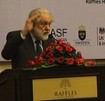 FDA and Creative Skillset also launch comprehensive training programme for distribution sector.
FDA and Creative Skillset also launch comprehensive training programme for distribution sector.
Lord Puttnam, President of Film Distributors’ Association (FDA), yesterday launched the UK film distribution sector’s first co-ordinated internship programme.
At an industry event at London’s Ham Yard Hotel, Lord Puttnam announced that up to 20 paid placements would be available in 2015, accommodating university graduates and school leavers from a range of backgrounds across the UK, with each placement lasting up to a year. Some placements will also be at exhibition and international sales companies.
The new programme – complementing existing internships at individual companies – will be delivered by FDA, the Independent Cinema Office (ICO) and Film Export UK, with the funding and support of Creative Skillset.
At least one distributor placement each year will be underwritten by a new FDA fund. In honour of film industry champion, Lord Attenborough CBE, who passed away in August 2014, this will be named The FDA Richard Attenborough Scholarship.
In making the announcement, Puttnam noted: “More than ever, the film industry’s future prosperity depends on the extent to which its products connect with audiences in an increasingly digital, consumer-empowered, social democracy. And the key to that is professional distribution which continually adapts to complex market conditions and subtly shifting audience preferences. Consumption is typically driven by a desire for individual titles, suggesting that our distribution and marketing operations are already effective and accomplished.
“But another constant factor is that the backbone of any company, the principal asset, is the people who work in it. The more our business models churn in flux, the more intuitive it feels to grip on to factors that remain solid and steady. Capable people, who naturally want to advance, appreciate receiving meaningful assistance in doing so. They want to gain skills; to be better versed in negotiation techniques or the vocabulary of finance; to become more confident in how to go about building and sustaining a business; to be more versatile and more useful to their companies.
“To the extent that this new training programme yields even better staff, staff who feel more valued, then it justifies itself as an essential part of the relentless drive for business achievement. The opportunity to improve your skills keeps people fresh and motivated, and provided the training is well executed, it can only serve to increase productivity. To my mind, these virtuous circles, combined with the fact that efficiency drives are looming ever higher up corporate agendas, make an investment in training utterly incontestable.
“The entire film sector is characterised by relatively small companies, and distribution is no different. Specific in-house training is, inevitably, not available to all of them. So it makes perfect sense for FDA, as the trade body, to create and refine a programme that’s fit for purpose right across the sector – a framework for everyone to engage with, or at least use as a starting point.”
Creative Skillset CEO, Dinah Caine CBE, added: “This is a brilliant programme that completely delivers to our best practice guidance on structured internships and apprenticeships in the media industries. We’re delighted that Creative Skillset is supporting the industry with these paid work placements that for the first time operate across film distribution, sales and exhibition companies and will help deliver the next generation of talent.”
More information on the internship scheme can be found here.
Training for distributors
The FDA also announced the sector’s largest training programme, to launch in January in partnership with Creative Skillset. More than 100 places will be available acros six strands.
The programme includes:
1) A practical foundation course for distributors with up to 2 years’ experience, imparting a greater understanding of today’s UK film value chain.
2) A new intermediate course for people with 2-3 years’ experience, with generic workshops focused on specialised films which account for most releases by volume.
3) A new edition of a cross-sector course for managers with at least 3 years’ experience. It offers professional coaching and management skills development in areas such as delegation, negotiation, performance management and communication styles, and is presented in partnership with the ICO and others.
4) A brand new suite of seminars for managers with at least 5 years’ experience, indicating ‘how to develop leadership in yourself and others’. With an international as well as a UK focus, this course will support participants willing to assume new responsibilities.
5) A social media course for distributors wishing to refresh and refine their ‘best use’ strategies across a range of social media sites and apps.
6) A script reading course of one-day seminars offering a structured approach to evaluating the potential of screenplays and assessing future projects.
Also, FDA with Creative Skillset support, offers:
The following additional opportunities and funding are now available, via Creative Skillset, to film distribution companies and staff:
1) 50% contribution for distribution company staff to attend Funded Training courses listed on the Creative Skillet website
2) Management and leadership bursaries and international scholarships.
3) Diversity bursaries.
4) Development grants of up to £10,000 to fund short-term training needs for distribution company staff




 In a speech at a Film Distributors’ Association event yesterday, Lord Puttnam addressed “the very latest developments in Europe, which I believe present opportunities and challenges for us all.”
In a speech at a Film Distributors’ Association event yesterday, Lord Puttnam addressed “the very latest developments in Europe, which I believe present opportunities and challenges for us all.”
 Lord Puttnam, speaking at a Film Distributors’ Association event in London yesterday, paid tribute to his late friend and colleague Richard Attenborough [pictured].
Lord Puttnam, speaking at a Film Distributors’ Association event in London yesterday, paid tribute to his late friend and colleague Richard Attenborough [pictured].
 What do you think is the definition of Cinema?
What do you think is the definition of Cinema?
 House of Lords member David Puttnam visited Yangon on October 9 and 10 in his capacity as trade envoy for the United Kingdom. He is most well known to the public as the independent producer of numerous award-winning films, including Midnight Express (1978), Chariots of Fire (1981) and The Killing Fields (1984). The Myanmar Times spoke with Puttnam following his visit to the Yangon Film School (YFS), where he talked with the students about the ways in which he came up with ideas for his various film projects.
House of Lords member David Puttnam visited Yangon on October 9 and 10 in his capacity as trade envoy for the United Kingdom. He is most well known to the public as the independent producer of numerous award-winning films, including Midnight Express (1978), Chariots of Fire (1981) and The Killing Fields (1984). The Myanmar Times spoke with Puttnam following his visit to the Yangon Film School (YFS), where he talked with the students about the ways in which he came up with ideas for his various film projects. David Puttnam, the U.K.’s trade envoy to Cambodia and the producer of the 1984 film “The Killing Fields,” on Tuesday warned that Cambodia could go the way of war-torn Middle Eastern countries if it fails to make stability a priority.
David Puttnam, the U.K.’s trade envoy to Cambodia and the producer of the 1984 film “The Killing Fields,” on Tuesday warned that Cambodia could go the way of war-torn Middle Eastern countries if it fails to make stability a priority.
 The first Forum for Responsible Business in Cambodia was held yesterday, 14th October, in Phnom Penh. About 400 participants took part ranging from government leaders, top industry players and other important stakeholders.
The first Forum for Responsible Business in Cambodia was held yesterday, 14th October, in Phnom Penh. About 400 participants took part ranging from government leaders, top industry players and other important stakeholders. “Really great cultures emerge when you use the very best of the past and have the courage to reinvent it and re-create it” – David Puttnam
“Really great cultures emerge when you use the very best of the past and have the courage to reinvent it and re-create it” – David Puttnam
 Oscar-winning British film-maker David Puttnam and his composer-pianist son Sacha Puttnam have a strong rapport that is apparent when one meets them.
Oscar-winning British film-maker David Puttnam and his composer-pianist son Sacha Puttnam have a strong rapport that is apparent when one meets them.